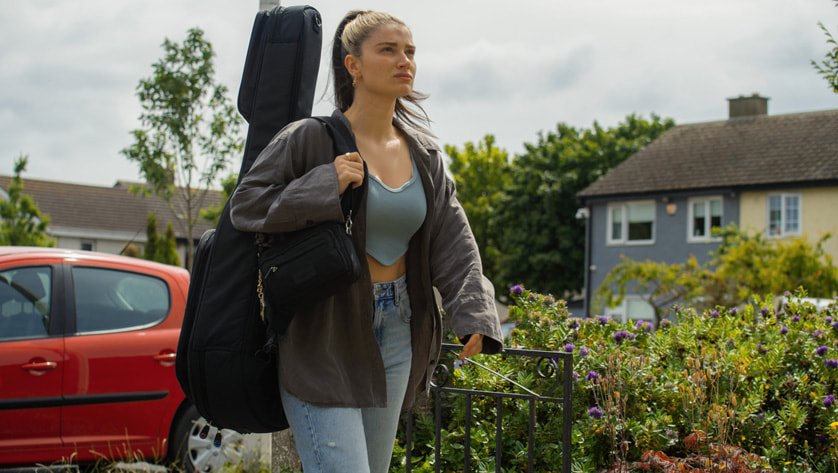‘Flora and Son’ Review
John Carney’s filmography is one of musical intrigue and a heartfelt ode to the power that music has in both life and film. While many will cite Once as remaining the best of his films, it’s his 2016 film, Sing Street, that combined reverence and infectious songwriting to create some of the most memorable songs in his films. The 1980s Dublin setting gave Carney’s film an endearing quality that has made Sing Street and its soundtrack a comfort to me since its release. While Carney’s latest film, Flora and Son, may swap out the extravagant costumes and synth-heavy rock songs for flannel and sappy acoustic arrangements, it still retains the charm of its protagonists and the struggles at home that only the soothing balm of music can fix. It’s the moments in between the notes that stand out in an otherwise predictable screenplay of dreamers and the lovesickness that often accompanies them.
The small character beats that accentuate the life lived, and the genuine care for each other are what help Flora and Son maintain some distinction from conventional storytelling. When Flora (Eve Hewson) is introduced to audiences, she’s trying to figure out her life. Her son, Max (Orén Kinlan), is one strike away from being sent to a juvenile correctional facility and while she wrestles with trying to keep him from breaking the law, she also realizes that the dreams she once had have fallen completely to the wayside. In a last-ditch attempt to keep her son busy, she rescues an acoustic guitar from a dumpster, brings it back to life, and tries to convince her son to distract himself with it. He’s got other musical interests though, forcing Flora to confront the fact that maybe she didn’t rescue the guitar for her son after all and that this might be the push she needs to achieve her dreams.
Jack Reynor plays Flora’s ex-husband, Ian - a washed-up pop-country singer whose early success left Flora to care for their son, Max, at an early age. He’s seen as the ‘cool’ parent because of that fame, and even though he’s seemingly been left behind by the industry, he’s still perceived by Max as greater than life itself. The various reasons people pursue music in Flora and Son nuance a screenplay that is more ruminative than an attempt to condemn the vanity possessed by some who pursue music for financial reasons more than creative and personal ones. The delusion is almost always present but is more measured in some than others.
The focus on being a young parent makes Flora and Son stand out from Carney’s other films. Ian and Flora’s relationship is antagonistic, but at this point, their concern with each other is only through their son. Max’s future weighs heavy on Flora, and while Ian may be a role model to Max, he’s also very hands-off regarding the parenting of his #1 fan. He has input, but it’s laced with memories of how his life went instead of understanding Max’s current reality of impending government punishment. Instead, the two find common ground in Flora and Son through their love for music, and how music seems to be the only hobby Max has taken up in his spare time that doesn’t involve breaking the law.
Interspersed throughout the nurturing of Max’s musical career is Flora’s pursuit of a life believed lost. She takes up guitar lessons virtually with Jeff (Joseph Gordon-Levitt), a failed musician in his own right who now teaches acoustic guitar lessons on the internet. Continents apart, the two form a connection that gives way to one of the film’s best scenes - an interrogation of how close two people can feel during a long-distance relationship. Carney employs clever techniques like having Flora and Jeff in the same room to punctuate the fact that they may not be together, but they are wrapped up in each other’s words. It’s the kind of flourish that can be maudlin in some films, but it’s surprisingly subdued in its sentimentality here. It captures their feelings for each other, but never plays it up too much.
As a result, Flora and Son feels a little subdued all over the place. Its touching moments are often scattershot, usually operating more as a brief vulnerable moment between two souls that are undercut by the music itself - on-the-nose acoustic ballads that feel somewhat forced on every character except Jeff. By the time the final song plays, it feels like its characters are secondary to the moment itself. It’s a culmination of musical styles explored throughout the film, but there’s little satisfaction besides the music itself. Carney’s screenplay feels like it wants to be neater than it has earned, seeming less interested in navigating where the characters are in their lives now and instead just bringing their threads together to have one genuinely good song to close things out. The characters may emotionally represent the style chosen, but their actual interests couldn’t be further off-key.


